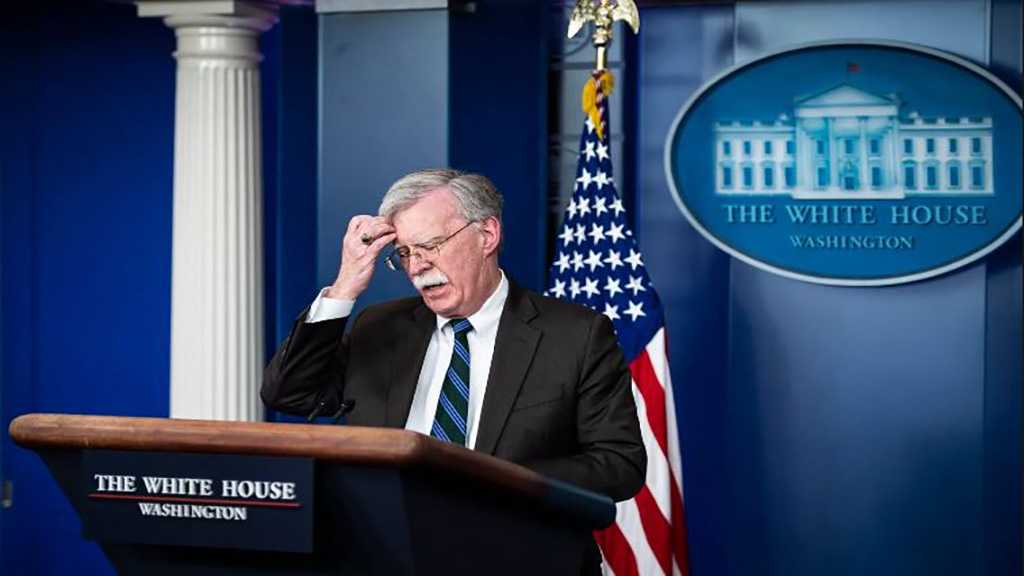
John Bolton and the Muddled Syria Withdrawal Mess

Aaron Blake
It may wind up being the most significant decision of Donald Trump’s presidency, and it’s a muddled mess.
The administration has been bobbing and weaving on its Syria policy for two years. It bobbed again Thursday, commencing some sort of withdrawal just days after a top official signaled things might be on hold.
Late last month, President Trump announced a total and immediate withdrawal of US troops from Syria, leading to two high-profile resignations, including [War] Secretary Jim Mattis. But then the administration seemed to backpedal a bit. The timeline was slowly drawn out and conditions were attached. It all culminated this weekend in national security adviser John Bolton declaring that the withdrawal would be conditioned on certain “objectives” being met: the complete defeat of Daesh, also known as ISIS, and an agreement by Turkey not to target the US's Syrian Kurdish allies once the United States was gone.
“We’re going to be discussing the president’s decision to withdraw, but to do so from Northeast Syria in a way that makes sure that ISIS is defeated and to make sure that the ‘defense’ of ‘Israel’ and our other friends in the region is absolutely assured, and to take care of those who have fought with us against ISIS and other ‘terrorist’ groups,” Bolton said Sunday in al-Quds.
Bolton added: “There are objectives that we want to accomplish that condition the withdrawal. The timetable flows from the policy decisions that we need to implement.”
Those conditions have not been met — or really anything close to it. Turkey, which helped persuade Trump to withdraw in the first place, has roundly rejected the US condition that it leave the Kurds, whom it regards as terrorists, alone.
Turkish President Recep Tayyip Erdogan declined to even meet with Bolton during his visit to the region and called Bolton’s comments “a serious mistake."
“The message that Bolton gave in “Israel” is unacceptable,” Erdogan said in a televised address to his political party Tuesday. “It is not possible for us to swallow.”
It’s also not clear Daesh is close to handled. As my colleague Liz Sly reported last month, “Signs that Daesh is starting to regroup and rumblings of discontent within the Arab community point to the threat of an insurgency."
Reporting indicates that, despite Bolton’s comments, the Pentagon has not received any updates on its withdrawal plans from last month and is moving forward with Trump’s plan. One anonymous defense official told the Wall Street Journal: “Nothing has changed. We don’t take orders from Bolton.”
It’s not impossible to square what Bolton said with a partial withdrawal. His comments never actually said there would be no withdrawal of troops without the conditions being met. Perhaps he was simply saying the United States wouldn’t completely withdraw until those conditions were met. Perhaps the speed of the withdrawal is what is contingent here.
National Security Council spokesman Garrett Marquis said that Bolton joined with the chairman of the Joint Chiefs of Staff Gen. Joseph F. Dunford Jr. and Syria envoy Ambassador James Jeffrey in Turkey to convey “the Administration’s five coordinated principles for implementing the President’s guidance on withdrawal.” Among them, according to a senior administration official, were that the withdrawal would happen “in a deliberate, orderly and strong manner” and that “the US will defeat the remaining Daesh caliphate on the way out.” That suggests Bolton’s conditions could still be in-play, even with a withdrawal in progress.
But if you’re Turkey, and you see the United States is already pulling out — at least to some extent — you have to wonder how ironclad Bolton’s demands were. We’ll see if the full withdrawal was truly conditional on Turkey acquiescing, because that doesn’t appear likely to happen.
And either way, there is just so much confusion here, completely of the administration’s own making. As The Washington Post’s John Hudson noted Thursday night, there’s no real clarity on whether Bolton’s conditions are operative. Even the five principles laid out in Turkey were more aspirations than demands. Instead of making sure the safety of the Kurds was “absolutely assured,” as Bolton required, they say, “The US wants a negotiated solution to Turkish security concerns,” and “The United States opposes any mistreatment of opposition forces who fought with the US against Daesh.”
Trump has made a point to say that he doesn’t like telegraphing military moves, which is understandable from a strategic standpoint. But in this case, he telegraphed the whole thing upfront. And if you’re going to attach conditions to something, you need to be abundantly clear about them. That has simply not been the case here, and we seem to get a different indication about this withdrawal every week or so.
The most likely conclusion, from there, is that there is no firm plan at this point, and that the likes of Bolton et al. are still trying to shape a withdrawal that is now already in motion.
Bolton downplayed that idea Friday morning, telling conservative radio host Hugh Hewitt, a Post contributing columnist, that “the media loves to find splits in the administration; it’s sort of a hobby of theirs.” He described all the above as “just part of an unfolding plan.”
But from the outside looking in, it seems a hell of a way to prosecute a hugely significant withdrawal from a fight against terrorists.
Source: The Washington Post, Edited by website team
Comments



